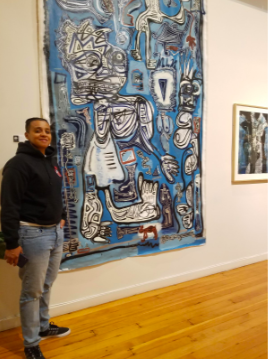- Las Positas College
- Reading & Writing Center
- Nonfiction Works
Reading & Writing Center
Writing From Positionality: Examples
Below are four examples of writing that is stylish because the writers are in control of word choice and sentence structure. Even when these writers choose not to write in “standard English,” or obey every single rule, they are purposeful with their sentence structure and diction.
These texts (a published essay, a professor’s letter to her students, a screenplay, and a Las Positas College student) use their authors' positionalities in different ways. The texts from which these excerpts come were all likely revised several times and not written at the last minute.
June Jordan and Her Students
In the essay “Nobody Mean More to Me than You and The Future Life of Willie Brown,” June Jordan tells the story of a time she helped a class of students write a letter to police who shot and killed a relative of a classmate. They chose to write the letter using familiar diction, or word choice. They felt that using the diction of their collective voice, rather than “standard English” better communicated their outrage:
You Cops! We the brother and sister of Willie Jordan, a fellow Stony Brook student who the brother of the dead Reggie Jordan. Reggie, like many brother and sister, he a victim of brutal racist police, October 25, 1984. Us appall, fed up because that another senseless death what occur in our community. This is what we feel, this from our heart, we ain’t staying silent anymore.
A “ technically correct” version would read something like this:
Dear Police Officers, We are the classmates of Willie Jordan at Stony Brook High School. Willie Jordan’s brother was shot and killed on October 25, 1984 by racist police officers in your department. We are outraged and tired by another senseless death in our neighborhood. We write this letter to express our profound sadness, and to make it is clear that we will no longer stay silent.
- The technically formal version in no way captures real emotion of the original version.
- The original does a good of capturing the sense that it was written by a community of people.
- The original also makes it clear through diction and speech patterns and/or grammar of their dialect that it was written by black folks.
- The technically correct version sounds too buttoned-up to capture the appropriate tone or emotion
- The use of the “we are,” while technically correct, does not actually achieve the sense that the letter was written by a collective of people.
- The original version has identity and heart.
"I find this weird to say but I felt once I started writing with style, I felt attached and proud to share my life experiences." ~C. Trujillo/LPC Student
Kisha Quesada Turner

Las Positas College English instructor Kisha Quesada Turner wrote an essay letter to her Umoja students about what it was like for her being naturally good at reading and writing in spite of stereotypes about black students that persist in higher education. The essay is called “Ni**as in English" (full text here). In the following excerpt, Quesada Turner writes about her favorite teacher using informal language that she might use when speaking with her students in person.
My 6th grade teacher, the one whose name is the answer to my security question when I forget my passwords, usta read my shit out loud to the class. I usta cringe when she did that. I did not like being known as smart. I did not like to stand out as a “teacher’s pet” or to even be suspected as her favorite. But, real talk, I knew my writing was good and I was proud of it. Why would I feel so embarrassed about my good-ass writing?
- Quesada Turner’s letter to her students is written in a variety of Englishes throughout. She uses informal expressions such as "usta" and "good-ass." She also uses specialized academic terms such as "diunital" (a term from African American studies that appears later in the essay).
- Like Quesada Turner does, you could experiment with blending your nonacademic style with your academic voice in your drafts. Make sure to get feedback from your audiences about the effect of your blended style.
- Words like “usta,” “yo’self,” and “aight” are words that Quesada Turner uses in speech with her friends, and often her students.
- Even though she’s a “fancy” English professor, Quesada Turner wasn’t born in England, and since she understands that language is a way to connect with people, she doesn’t speak in a way people usta expect English professors to speak. She uses different Englishes that help her form connections and gain trust.
- Throughout her letter, Quesada Turner adjusts her diction/word choice to match the tone of the topic of each particular paragraph.
- Quesada Turner's letter to her students is fresh, innovative, and an effective way to connect with students of color who may have also had school experiences that felt like they weren’t designed with them in mind at all.
Donald Glover

Published writers who trust what their own positionalities can bring to a text are often celebrated for creating something fresh and innovative.
There are several examples of innovation via positionality in the screenplay from the pilot of the award winning TV show Atlanta written by Donald Glover. In this excerpt that sets up a scene near the end of the pilot episode, it’s the details that suggest a positionality. The positionality expressed is mostly a class positionality.
EARN is sitting in a seat on the bus with Lottie in his arms, asleep. He has earphones on. “Don’t Disturb This Groove” by The System is all we can hear, as if we’re Earn. Earn looks out the window solemnly while eating a Wendy’s burger with his one free hand. Everyone on the bus looks dead. Just sad and dead. That look after you’ve worked so hard, all day, and you don’t know why.
- Using the song “Don’t Disturb This Groove,” by the 80s synthpop R&B group, The System, does suggest a race positionality, as The System are a Black R&B group.
- The song itself suggests that the kind of music that Earn listens to demonstrates that Earn is not the kind of music readers/viewers might not expect someone like Ern to listen to since he’s the manager of his cousin, Alfred “Paper Boy’s,” rap career.
- The class positionality which is the main focus of the perspective is illustrated by the bus and the description of the people riding the bus and how they feel after working hard all day, doing the kind of work that is both physically and mentally draining on the body.
- The class positionality intersects with a race positionality, because in America, it’s often poor black, brown, and white folks who ride the bus and do work that requires physical labor.
Yingci Qi
Yingci Qi, a Las Positas College student from China, writes explicitly about her positionality as she makes connections between growing up in the collectivist China and two dystopian novels that she read in her critical thinking course.
This excerpt is from the conclusion of the essay where she uses her lived experience to make the point that she was formerly unable to recognize the effects of collectivism on her life until she had moved to the US and read the books We and 1984.
Political consciousness has never appeared in my mind so vivid until I detached myself from the collectivist society. Zamayatin’s We and Orwell’s 1984 extricate me from the illusion formed by the collectivist regime; their incisive content, like a hammer, strikes heavily on my ignorance. During my education in China for eleven years, I had never thought of the student life to be problematic in a way that it wears away a person’s individuality, or maybe I never gained the time to think. Although I have been taught to have faith in collectivism, I have never reflected on it until now.
The purpose of this essay was to research an aspect of dystopian literature (she chose collectivism) and students were required to read, analyze and discuss at least two novels, two literary criticism articles, and one other academic source.
- Yingci doesn’t use the first person “I” in the majority of the essay, but she does use it as she’s wrapping up the essay.
- Using the first person “I”, helps Yingci make the point that she wants to make: the connection between her lived experience as a student in collectivist China where “where students’ daily routine is an operation procedure that fades the individuality of a person so that they would submit themselves to a collective.”
- Using her lived experience to make this point is way more powerful than quoting some expert who has never themselves experienced what they are writing.
- You may have also noticed that on a sentence level that there are places that are not structurally “correct,” places that might be translations from Chinese that find their way into traditional English sentence structure.
- Note that these first-language structure appearances do NOT impede meaning, nor do they distract from what the student is saying quite eloquently.
- You’ll also want to note that the critical thinking done by this student is so sophisticated in the excerpt, and the rest of the essay, that first-language structure appearances really don’t matter. Pointing them out when the student is making such eloquent, convincing, and sophisticated statements would be nitpicking.
- This paper used a number of metaphors such as, “like a hammer, strikes heavily on my ignorance.” It is common for students from China to frequently use metaphors in their writing. In fact, many scholars believe that “poetry played a unique, indispensable role in the making of Chinese culture.” The regular use of metaphors by this student are, arguably, an example of her positionality.

